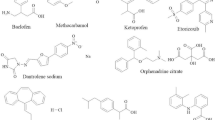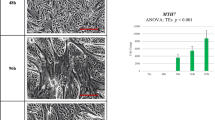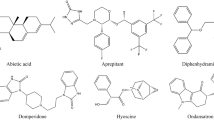Abstract
CERTAIN intermediates of the tricarboxylic acid cycle antagonize the reserpine inhibition of contractions induced by drugs of isolated guinea pig ileum1 (Table 1). We have observed that the most effective reserpine antagonists were those added as the free acids. These reduced the reaction of the bath–fluid to about pH 5. When the reaction was reduced to similar levels by the addition of small volumes of 0.2 N hydrochloric acid, antagonism to reserpine was also seen. This was less marked, however, than that following addition of the most effective metabolites, which included α-ketoglutaric acid (1 mgm. per ml.) and cis-aconitic acid anhydride (1 mgm. per ml.). At a bath pH of 7.4, no antagonism to reserpine was seen.
Similar content being viewed by others
Article PDF
References
Gillis, C. N., and Lewis, J. J., Nature, 178, 859 (1956).
Furchgott, R. F., and Wales, M. R., Amer. J. Physiol., 169, 326 (1952).
Gillis, C. N., and Lewis, J. J., J. Pharm. Pharmacol., 8, 606 (1956).
Krebs, H. A., and Henseleit, K., Z. physiol. Chem., 210, 33 (1932).
Plummer, A. J., Barret, W. E., and Rutledge, R., Amer. J. Dig. Dis., 22, 337 (1955).
Author information
Authors and Affiliations
Rights and permissions
About this article
Cite this article
GILLIS, C., LEWIS, J. Action of Reserpine on Isolated Intestinal Muscle. Nature 179, 820 (1957). https://doi.org/10.1038/179820a0
Issue date:
DOI: https://doi.org/10.1038/179820a0



